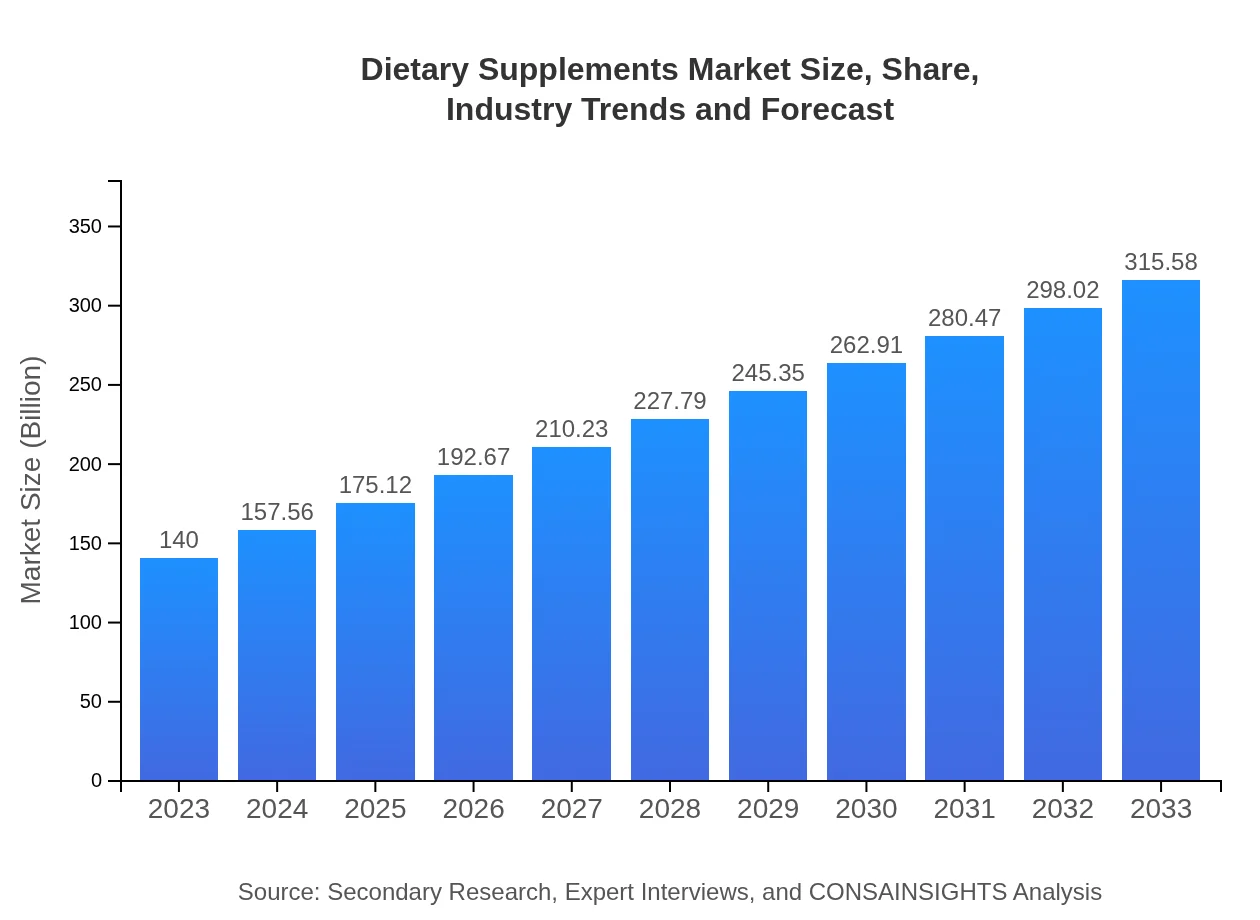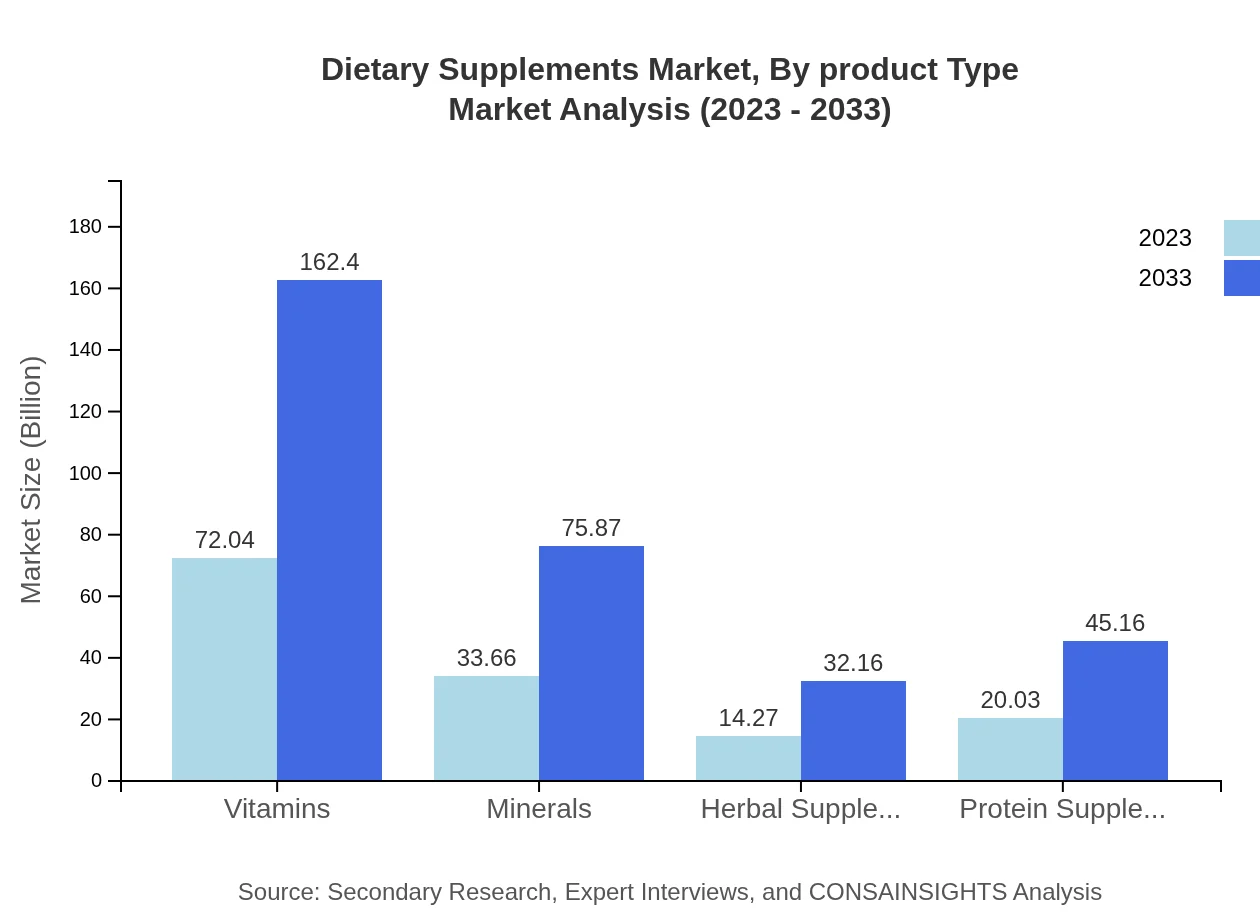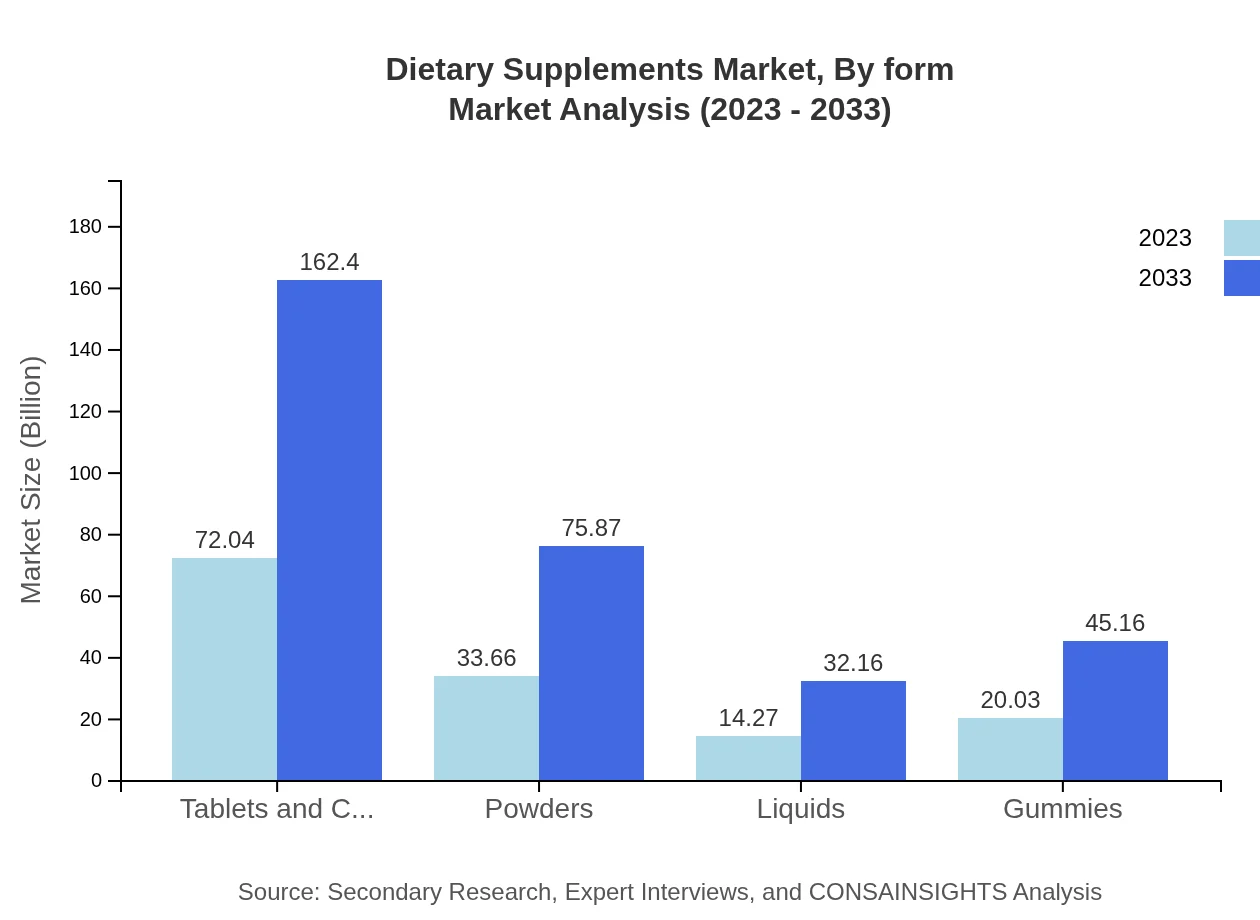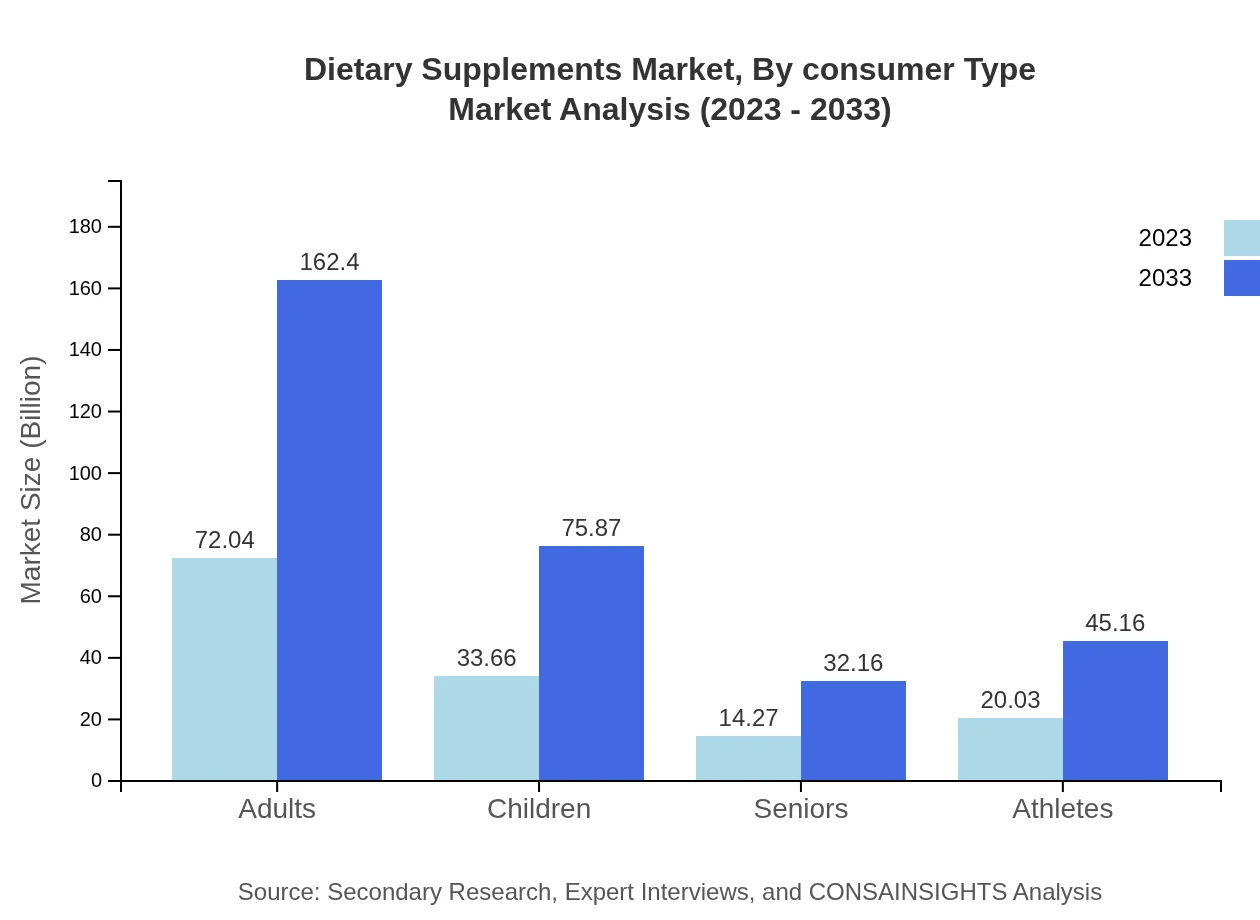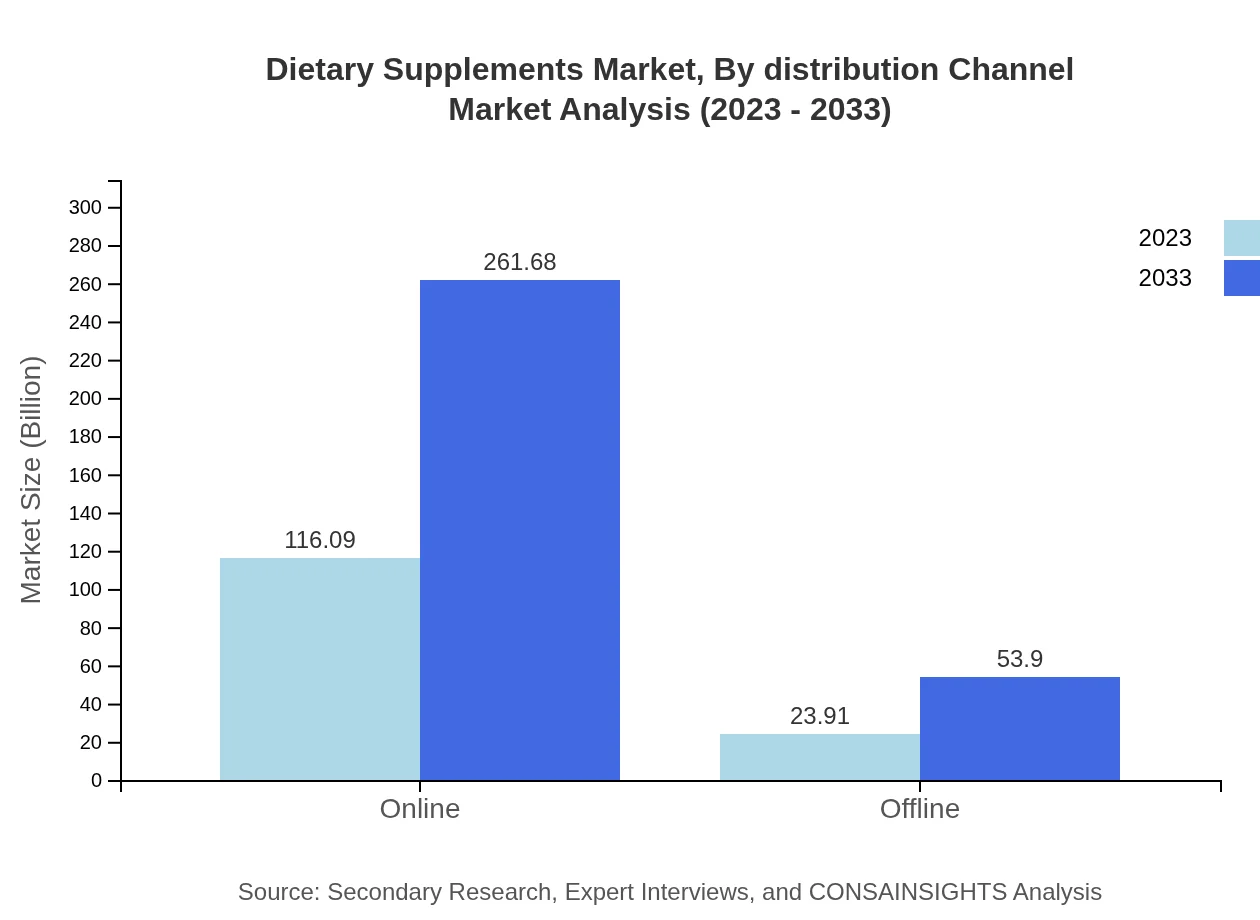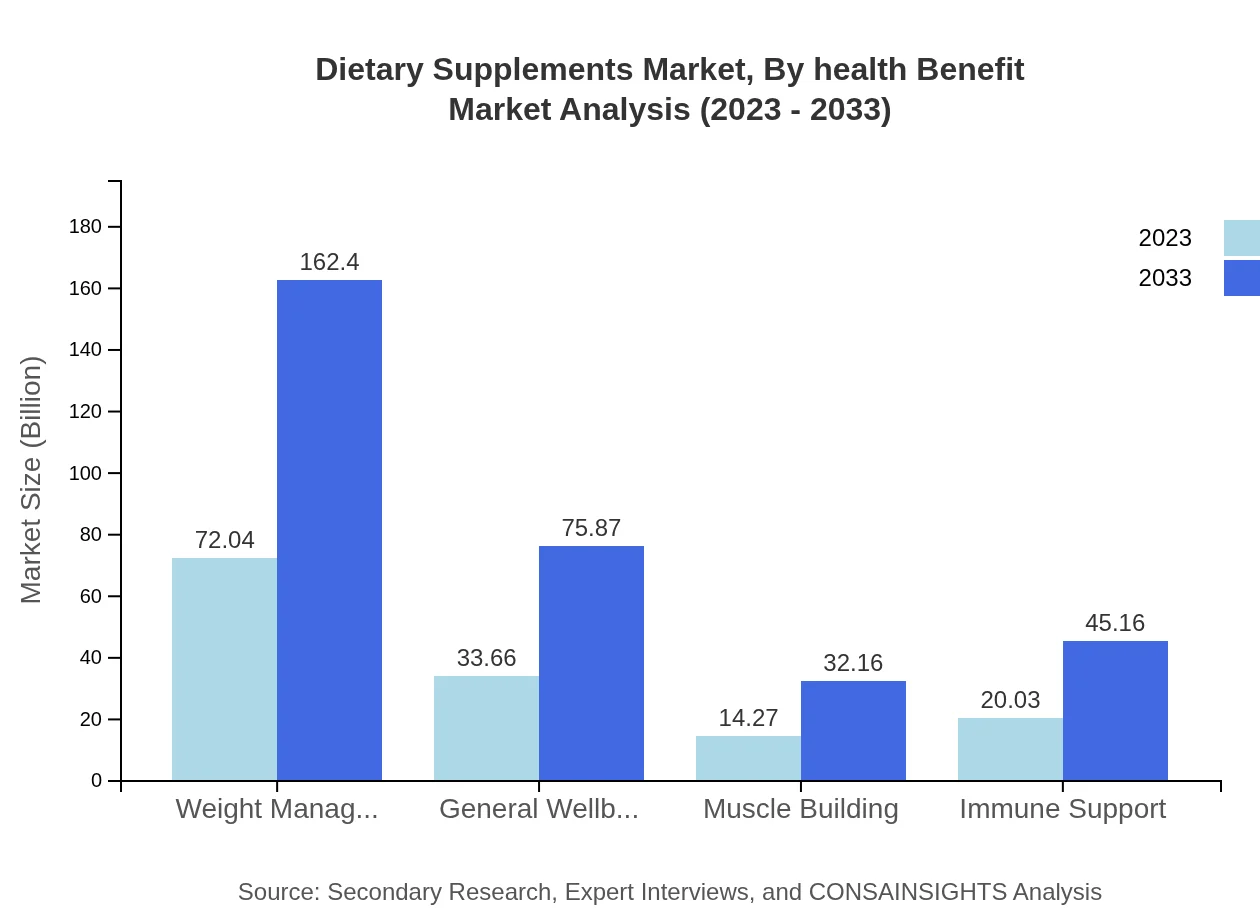Dietary Supplements Market Report
Published Date: 31 January 2026 | Report Code: dietary-supplements
Dietary Supplements Market Size, Share, Industry Trends and Forecast to 2033
This report provides an in-depth analysis of the Dietary Supplements market, detailing market size, segmentation, growth forecasts, and trends from 2023 to 2033. Insights into regional dynamics and key players are also included to inform stakeholders about the future landscape of the industry.
| Metric | Value |
|---|---|
| Study Period | 2023 - 2033 |
| 2023 Market Size | $140.00 Billion |
| CAGR (2023-2033) | 8.2% |
| 2033 Market Size | $315.58 Billion |
| Top Companies | Amway, Herbalife, GNC Holdings |
| Last Modified Date | 31 January 2026 |
Dietary Supplements Market Overview
Customize Dietary Supplements Market Report market research report
- ✔ Get in-depth analysis of Dietary Supplements market size, growth, and forecasts.
- ✔ Understand Dietary Supplements's regional dynamics and industry-specific trends.
- ✔ Identify potential applications, end-user demand, and growth segments in Dietary Supplements
What is the Market Size & CAGR of Dietary Supplements market in 2023?
Dietary Supplements Industry Analysis
Dietary Supplements Market Segmentation and Scope
Tell us your focus area and get a customized research report.
Dietary Supplements Market Analysis Report by Region
Europe Dietary Supplements Market Report:
The European market, valued at $39.96 billion in 2023 and projected to reach $90.07 billion by 2033, is characterized by robust regulatory frameworks and a growing demand for plant-based and organic products. The increasing prevalence of lifestyle diseases propels the consumption of supplements aimed at preventive health.Asia Pacific Dietary Supplements Market Report:
As of 2023, the Asia-Pacific dietary supplements market is valued at $27.59 billion and is projected to grow to $62.20 billion by 2033. The region is witnessing increasing consumer awareness regarding health, lifestyle diseases, and nutritional supplements. The rise in disposable incomes and market access due to e-commerce are pivotal drivers of growth in this region.North America Dietary Supplements Market Report:
Valued at $49.15 billion in 2023, the North American dietary supplements market is anticipated to expand significantly to $110.80 billion by 2033. The region benefits from advanced healthcare infrastructure, high consumer awareness, and stringent regulations ensuring product safety and efficacy, positioning North America as a leading market.South America Dietary Supplements Market Report:
The South American dietary supplements market is currently valued at $4.13 billion for 2023, expected to reach $9.31 billion by 2033. This growth is propelled by a growing population interested in health products, although economic fluctuations may pose challenges. Local manufacturers and an influx of international brands are enhancing market competition.Middle East & Africa Dietary Supplements Market Report:
In the Middle East and Africa, the dietary supplements market is valued at $19.17 billion in 2023 and is expected to grow to $43.20 billion by 2033. The growth is driven by a young population and increasing demand for health and wellness products, despite certain challenges related to distribution and regulation.Tell us your focus area and get a customized research report.
Dietary Supplements Market Analysis By Product Type
The dietary supplements market can be segmented into vitamins, minerals, protein supplements, herbal supplements, and amino acids. Vitamins account for a significant portion of the market, with sales expected to reach $162.40 billion by 2033, maintaining a market share of 51.46%. Similarly, minerals are projected to follow suit, with a size of $75.87 billion by 2033.
Dietary Supplements Market Analysis By Form
In terms of form, the market is classified into tablets and capsules, powders, liquids, and gummies. Tablets and capsules dominate the market with a total share of 51.46%, while powders and liquids account for 24.04% and 10.19%, respectively. Market trends indicate that the convenience of gummies is increasing their popularity, projected to reach $45.16 billion by 2033.
Dietary Supplements Market Analysis By Consumer Type
The market is segmented into consumers based on demographics, including adults, children, seniors, and athletes. Adults represent the largest segment, with an expected market size growth from $72.04 billion to $162.40 billion. The senior segment grows in response to aging populations focusing on health maintenance and preventive measures.
Dietary Supplements Market Analysis By Distribution Channel
The distribution channels for dietary supplements comprise online and offline sales. Online channels are experiencing robust growth, with market size projected to reach $261.68 billion by 2033, driven by the convenience of e-commerce. Offline channels, while experiencing slower growth, represent a substantial segment, expected to reach $53.90 billion.
Dietary Supplements Market Analysis By Health Benefit
Segments in the market based on health benefits include weight management, immune support, and general wellbeing. Each of these benefits targets specific consumer needs and preferences. The immune support segment is expected to show high growth rates due to increasing health awareness and the ongoing global emphasis on health maintenance.
Dietary Supplements Market Trends and Future Forecast
Tell us your focus area and get a customized research report.
Global Market Leaders and Top Companies in Dietary Supplements Industry
Amway:
Amway is one of the largest direct-selling companies in the world, offering a wide range of dietary supplements under its Nutrilite brand, focusing on quality and sustainability.Herbalife:
Herbalife is known for its science-based nutrition products, specializing in meal replacements and weight management solutions that cater to a diverse clientele across the globe.GNC Holdings:
GNC is a well-known retailer of health and wellness products, including dietary supplements, vitamins, and minerals, catering primarily to fitness enthusiasts and health-conscious consumers.We're grateful to work with incredible clients.









FAQs
What is the market size of dietary Supplements?
The global dietary supplements market was valued at approximately $140 billion in 2023 and is projected to grow at a CAGR of 8.2% through 2033, promising significant expansion across various segments.
What are the key market players or companies in this dietary Supplements industry?
Key players in the dietary supplements market include large companies such as Herbalife Ltd, Abbott Laboratories, and Glanbia plc. These corporations dominate with extensive product offerings and strong brand recognition in health and wellness.
What are the primary factors driving the growth in the dietary supplements industry?
Factors driving growth include the increasing health consciousness among consumers, rising disposable incomes, and a growing preference for preventive healthcare solutions, particularly among aging populations and fitness enthusiasts.
Which region is the fastest Growing in the dietary supplements market?
Asia Pacific is the fastest-growing region in the dietary supplements market, expected to grow from $27.59 billion in 2023 to $62.20 billion by 2033, driven by a surge in health awareness and demand for functional foods.
Does ConsaInsights provide customized market report data for the dietary supplements industry?
Yes, ConsaInsights offers customized market report data tailored to specific needs, allowing businesses to access precise insights and strategic recommendations relevant to the dietary supplements industry.
What deliverables can I expect from this dietary supplements market research project?
From the market research project, you can expect comprehensive reports including market analysis, growth forecasts, detailed segmentation data, competitive landscape assessments, and actionable insights for strategic planning.
What are the market trends of dietary supplements?
Current trends in the dietary supplements market include a shift towards plant-based products, personalized nutrition, and increased online sales optimization, reflecting changes in consumer preferences and technological advancements.

